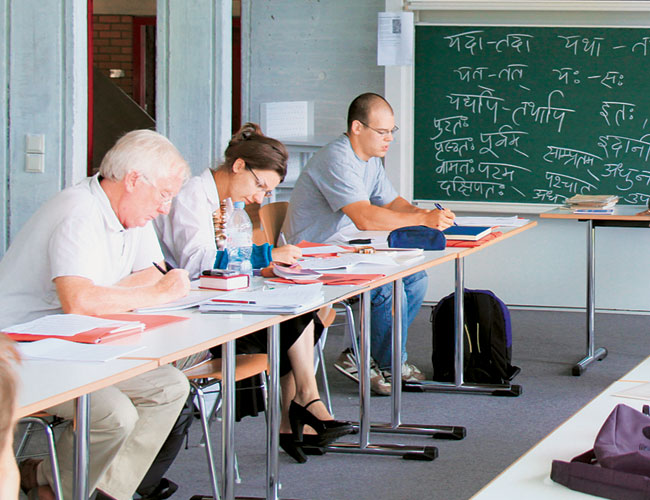Will Germans be the eventual custodians of Sanskrit, its rich heritage and culture?
If the demand for Sanskrit and Indology courses in Germany is any indication, that’s what the future looks like. Unable to cope with the flood of applications from around the world, the South Asia Institute, University of Heidelberg, had to start a summer school in spoken Sanskrit in Switzerland, Italy and – believe it or not – India too.
“When we started it 15 years ago, we were almost ready to shut it after a couple of years. Instead, we had to increase strength and take the course to other European countries,” said Professor Dr. Axel Michaels, head of classical Indology at the university. In Germany, 14 of the top universities teach Sanskrit, classical and modern Indology compared to just four in the UK.
The summer school spans a month in August every year and draws applications from across the globe. “So far, 254 students from 34 countries have participated in this course. Every year we have to reject many applications,” said Dr. Michaels. Apart from Germany, the majority of students come from the US, Italy, UK and the rest of Europe.
Linking Sanskrit with religion and a certain political ideology was “stupid” and “detrimental to the cause” of its rich heritage, the professor said. “Even the core thoughts of Buddhism were in the Sanskrit language. To better understand the genesis of oriental philosophy, history, languages, sciences and culture, it’s essential to read the original Sanskrit texts as these are some of the earliest thoughts and discoveries,” he added.
Francesca Lunari, a medical student who has been studying Sanskrit at Heidelberg University, agreed. “I am interested in psychoanalysis and must know how human thoughts originated through texts, cultures and societies. I will learn Bangla also to decipher the seminal works of Girindra Sekhar Bose, a pioneer of oriental psychiatry who has hardly been studied – even in India. Learning Sanskrit is the first step,” she said.
Languages such as Bangla, in which Bose had written his theories challenging Freud, might face a crisis similar to Sanskrit because of the onslaught of English if these languages aren’t preserved within households, felt Dr Hans Harder, head of the department of modern South Asian languages and literatures (modern Indology), Heidelberg University.
“A significant part of the global cultural heritage will become extinct if major languages like Hindi and Bangla fall prey to Indian English which, in the process, has only got poorer,” he added. An expert in Bangla, Hindi and Urdu apart from European languages, Harder cautioned against such a disaster as more upwardly mobile families stop teaching their own language to their children.
Studying ethno-Indology helps contextualise and link subjects to ancient texts.
“One can better understand evolution of politics and economics by studying Arthashastra by Chanakya,” said Dr. Michaels. So this semester the institute is offering a course on ‘human physiology and psychology in the early Upanishads’ by Anand Mishra, an IIT mathematics graduate who took up the study of Sanskrit for his research on evolving a more grammatically suitable computing language. “Working on Panini’s Sanskrit grammar, I realised it could be a great tool in computing language,” said Mishra.
Dr. Michaels feels that instead of indulging in a political and religious debate, Indians should try to preserve their heritage. “Don’t we conserve a rare, old painting or sculpture? This is a live language…and rich cultural heritage which might become the casualty of neglect just as great civilisations like Hampi, the art of Ajanta and temples of Konark got buried in oblivion. It was up to the British to discover them later. Sanskrit, along with its culture, philosophy and science might become similarly extinct,” he claimed, adding: “On the other hand, there is so much yet to discover through Sanskrit…details of Indus Valley civilisation, for example.”
Germany has already been a storehouse of Sanskrit scholars to the world. “The majority of Sanskrit scholars, including those at Harvard, California Berkeley and the UK, are Germans,” he said.
But why? “Probably because we never colonised India and maintained a romantic view about it,” quipped Dr. Michaels.
Source: EXCLUSIVE: Germans to be the eventual custodians of Sanskrit? : India, News – India Today

